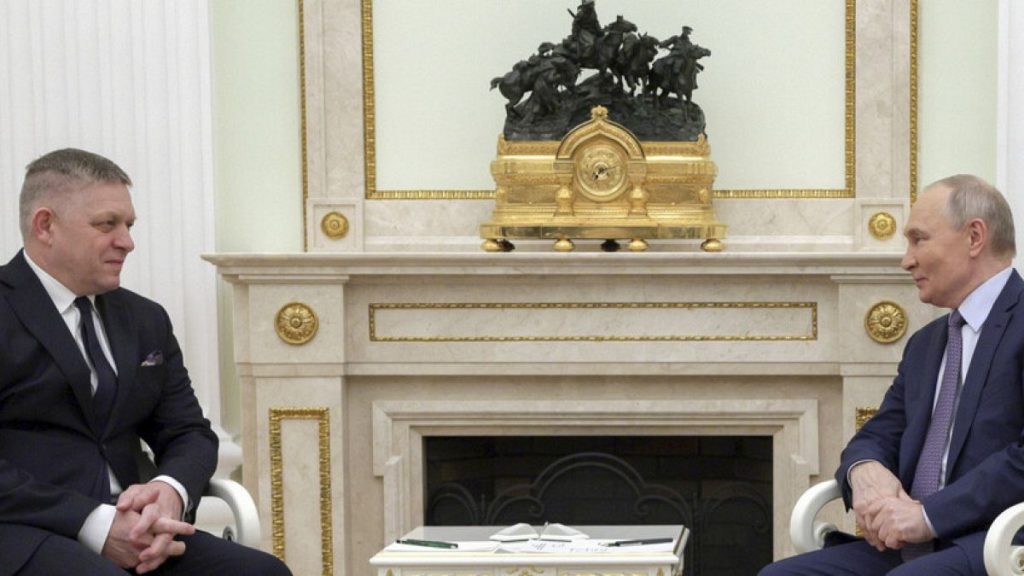The simmering tension between Ukraine and Slovakia escalated dramatically following Slovak Prime Minister Robert Fico’s controversial visit to Moscow and his subsequent meeting with Russian President Vladimir Putin. Ukrainian President Volodymyr Zelenskyy launched a scathing attack on Fico, accusing him of aiding Putin’s efforts to destabilize Europe by prioritizing Russian gas supplies over European solidarity and energy independence. This visit, a rare occurrence for an EU leader since Russia’s full-scale invasion of Ukraine, came on the heels of Zelenskyy’s announcement at the European Summit in Brussels that Ukraine would not renew the gas transit agreement with Russia, which allows Russian gas to flow through Ukraine to several European countries, including Slovakia. Zelenskyy framed Fico’s actions as a betrayal, highlighting the financial benefits Fico allegedly receives from maintaining ties with Russia, suggesting these outweigh Slovakia’s national interests and European security concerns.
The core of the dispute revolves around the expiring gas transit agreement and Slovakia’s dependence on Russian gas. While Zelenskyy views the non-renewal of the agreement as a crucial step towards weaning Europe off Russian energy and crippling Putin’s war chest, Fico sees it as a threat to Slovakia’s economy. Fico’s decision to seek a separate arrangement with Putin, rather than exploring alternative energy sources, drew sharp criticism from Zelenskyy, who accused him of prioritizing personal gain over European unity and the security of Ukraine. Zelenskyy pointed to alleged financial incentives provided by the Kremlin to Fico, linking them to Slovakia’s continued reliance on Russian gas and the revenue generated from the oil pipeline traversing Ukrainian territory.
Zelenskyy’s accusations did not stop at financial impropriety. He further asserted that Fico actively resisted European efforts towards energy independence, choosing instead to support Russia’s agenda of pushing American and alternative energy sources out of the European market. He contrasted Fico’s alleged pursuit of personal financial gain, estimated at $500 million annually from gas deals and another $500 million from the oil pipeline, with Ukraine’s human cost in the ongoing war. This stark comparison aimed to highlight the moral implications of Fico’s actions and portray him as prioritizing personal enrichment over the lives lost in the conflict. Zelenskyy also alluded to potential involvement of Slovak law enforcement and special services in “murky schemes” related to Russian gas deals, further deepening the rift between the two countries.
The ramifications of Fico’s visit extended beyond Ukraine’s condemnation. Domestically, thousands of Slovaks took to the streets of Bratislava in protest, denouncing Fico as a traitor and rejecting his leadership. Michal Šimečka, leader of the opposition party Progressive Slovakia, echoed these sentiments, accusing Fico of shameful behavior that undermined Slovakia’s national interests and betrayed its partners. He criticized Fico for turning Slovakia into a tool of Kremlin propaganda and argued that if gas supply was truly the primary concern, negotiations should have been directed towards Ukraine, not Russia. This internal dissent further complicated the situation, showcasing the deep divisions within Slovakia concerning its relationship with Russia and the ongoing war in Ukraine.
Meanwhile, on the battlefield, the situation for Ukraine continues to deteriorate. Reports indicate significant Russian advances in several areas, particularly in the Kharkiv and Donetsk regions. Russia’s capture of Avdiivka earlier this year proved to be a turning point, facilitating further offensives and territorial gains. Facing troop shortages, Ukraine has been forced to cede key territories, struggling to repel the Russian onslaught. The potential for a Russian counteroffensive, possibly involving North Korean troops, further darkens the outlook for Ukraine, with little prospect for a shift in momentum.
In conclusion, Fico’s Moscow visit ignited a firestorm of controversy, straining relations between Ukraine and Slovakia and highlighting the deep divisions within Slovakia itself. Zelenskyy’s accusations of financial impropriety, coupled with allegations of undermining European energy independence, painted a picture of Fico prioritizing personal gain and Russian interests over Ukrainian security and European unity. The domestic protests and condemnation from opposition leaders further underscored the gravity of the situation, while the ongoing battlefield losses paint a grim picture for Ukraine’s future. The clash between Zelenskyy and Fico serves as a stark reminder of the complex political and economic considerations surrounding the war in Ukraine and the challenges faced by European nations in navigating their relationships with Russia.














